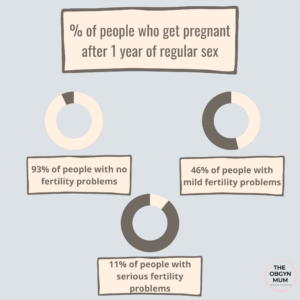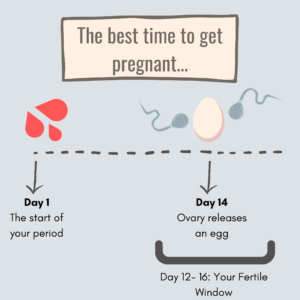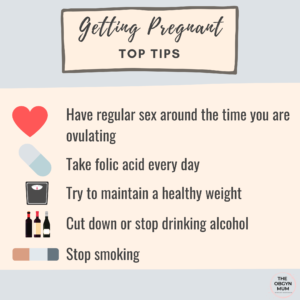Trying for a baby can be an overwhelming time with the process taking over every inch of your existence. When all you are desperate for is a positive pregnancy test, when it comes back negative each month it can leave you wondering how long does it really take to become pregnant?
How long should I keep trying for?
The time it takes to get pregnant can vary for each couple, with a lot of factors coming into play.
The majority of people having regular sexual intercourse will get pregnant within a year of trying for a baby. Around 1 in 3 people will get pregnant within a month of trying but it’s important to remember these are just statistics to help guide your expectations and there are no hard and fast rules.

What does regular sex mean?
When you hear people talk about regular sex they mean having unprotected sex every 2 to 3 days (1)
NICE (2013)
It’s normal for this to feel stressful, especially if trying for a baby is taking longer than you expected.
When should you have sex?
The optimal time to have sex when you’re trying for a baby is in the days when an egg is released from your ovary, called ovulation.

An egg is released around day 14 of your cycle; two weeks after the first day of your period. The days before and day after ovulation are the most fertile and this is sometimes called your ‘fertile window’.
It can be helpful to track your periods and use an ovulation tool calculator to try and tell you when your fertile window is.
Age and getting pregnant
I have written a post dedicated to how your age can affect your fertility which you can read here. Your age is not something you can control and many couples are having babies later in life for very valid reasons.
It’s important to know that your ability to get pregnant declines with age and this decline speeds up after the age of 35 and so it can take longer to get pregnant (2). This is because the number and quality of eggs decreases. Male fertility also declines with age, though not as much as female fertility.
One study found that for couples having regular unprotected sex (3):
- around 7 out of 10 women aged 30 will conceive within one year
- around 6 out of 10 women aged 35 will conceive within one year
- around 4 out of 10 women aged 40 will conceive within one year.
After the age of 40, it gets harder to conceive and you may be offered fertility treatment if you don’t fall pregnant naturally within 6 months.
Contraception
Some types of contraception can cause a delay in getting pregnant after you stop taking it. The progestogen-only injection for contraception may delay normal fertility for up to one year after the last injection.
If you take the contraceptive pill it’s advised to delay trying to conceive until you have had one normal period. This will help your team to date any future pregnancy more accurately.
When should I get help with trying to get pregnant?
Around 1 in 7 couples will have difficulties getting pregnant (1).
Your GP will talk to you about your lifestyle, general health and medical history. They can run some initial investigations and give you advice on improving your chances of getting pregnant. Many doctors will prefer you to have been having regular sex without contraception for at least a year before referring you for fertility tests.
If you have been having regular sex for a year and you’re not pregnant, it doesn’t mean you can’t get pregnant but it’s a good idea to go and see your GP. Make an appointment sooner if:
- you are over 36
- you have a known fertility issue, such endometriosis or polycystic ovary syndrome (PCOS) or premature ovarian insufficiency
- your partner has a known fertility issue
- you are concerned you or your partner may have a medical problem that may be stopping you from getting pregnant
- you are having irregular or no periods
Top tips for trying to get pregnant:
- Have regular sex around the time you are ovulating
- Take folic acid every day
- Try to maintain a healthy weight
- Cut down or stop drinking alcohol
- Stop smoking

If you need to have tests to investigate your fertility, read this post to find out about what to expect.
References
1. NICE. Fertility problems: assessment and treatment. Natl Inst Heal Care Excell Guidel. 2013;(February 2013).
2. Ledger W, Nikolaou D. Reproductive ageing (Scientific Impact Paper No. 24). R Coll Obstet Gynaecol. 2009;(24).
3. Sozou PD, Hartshorne GM. Time to Pregnancy: A Computational Method for Using the Duration of Non-Conception for Predicting Conception. PLoS One. 2012;7(10).
